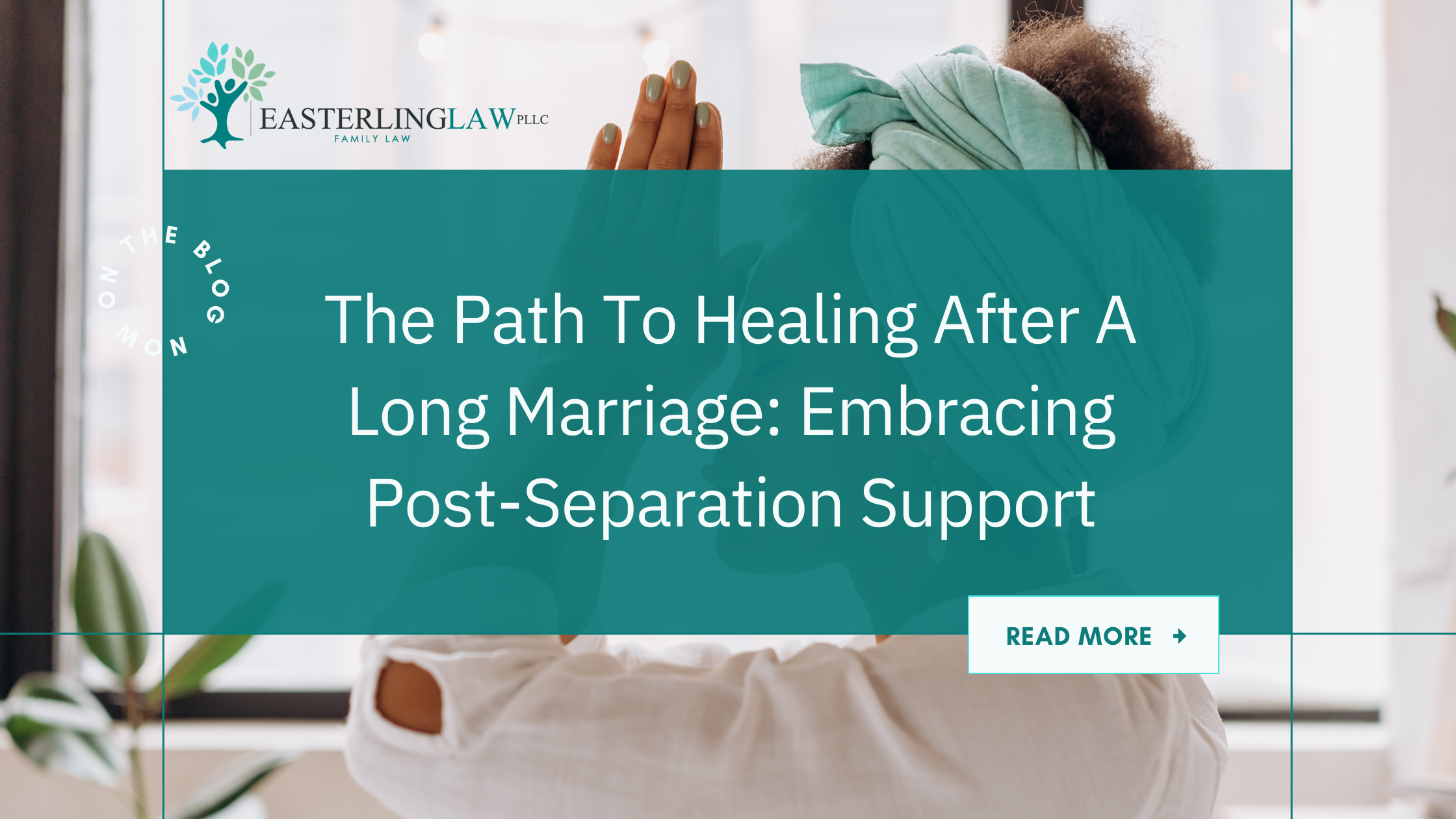Summary of Keywords
- Divorce after a long marriage is both a legal and emotional transition: The article emphasizes that even when separation is intentional, it is normal to grieve the loss of a long-term relationship while moving toward a new chapter.
- Emotional support is essential alongside legal guidance: Easterling Law highlights the importance of recognizing the emotional toll of divorce, especially after decades together, and approaching the process with empathy rather than conflict.
- Healing requires awareness, connection, and healthy coping: The article encourages emotional awareness, avoiding isolation or numbing behaviors, and seeking support through therapy, books, or support groups to process grief and change.
- Self-care and routine play a critical role in recovery: Maintaining sleep, nutrition, exercise, and emotional expression are presented as foundational practices for healing during post-separation life.
- Strong relationships support long-term healing: Leaning on trusted people and maintaining human connection are framed as key factors in navigating divorce and rebuilding life after a long marriage.
When you spend a significant portion of your life with a partner, beginning the divorce process can be emotionally overwhelming—even if you were the one who wanted to terminate the marriage. It is okay to want to end your marriage while simultaneously grieving for losing it. Never make the mistake of assuming you are alone with your feelings. Others are experiencing the same feelings, and even more, have emerged from feeling renewed and excited about the next chapter of their lives.
In addition to supporting your legal needs, Easterling Law recognizes the intricate emotional landscape for divorcing after spending a decade or more together. That isn’t to say we are therapists; we’re not. We’re empathetic to your situation and appreciate the importance of post-separation support and its contributions to healing. Rather than attacking your spouse, we focus on supporting and protecting the client’s long-term interests. If you share children, your relationship with your spouse isn’t ending insofar as it is changing. Our role is to provide the legal assistance needed to finalize your divorce while remembering you are going through a challenging ordeal.
Embrace Healing
After a long marriage, it is shortsighted to assume that ending the relationship is only a legal process. It’s an emotional transition in your life. In Bessel A. van der Kolk’s seminal work, The Body Keeps the Score: Brain, Mind, and Body in the Healing of Trauma, he says, “Neuroscience research shows that the only way we can change the way we feel is by becoming aware of our inner experience and learning to befriend what is going on inside ourselves.” Books like these can help us to comprehend what our bodies and minds are going through. People tend to judge themselves less when they realize their feelings are normal and are being felt by others.
With that said, don’t isolate yourself. One of the best ways to process emotions is to feel them. Don’t hide behind alcohol, online shopping, or binge-watching television shows. Nothing is terrible about those things unless you use them to distract yourself. Another effective method is by talking through them and seeking the assistance of a mental health professional to develop healthy and productive coping mechanisms. Give yourself room for emotional exploration. Additionally, people may seek support groups to connect with others on a similar journey. These are excellent platforms for sharing experiences, seeking advice, and fostering a sense of belonging during transition.
Nurturing Healing: Tips for the Journey Ahead
It isn’t selfish to take care of yourself, nor is it weak to ask for help. As you work toward healing after a long marriage, don’t lose sight of its importance as life takes over. Honor your emotions by allowing yourself to experience all of them. Grief, anger, loneliness, and fear are part of the healing process. Regardless of what happens, ensure you are going to sleep at consistent times, eat food that fuels you, and engage in exercise.
There’s an old saying that you only need three things to be successful. The first is surrounding yourself with good people. And if you can do that, you don’t need the other two. Lean on your loved ones. Connection aids in healing, and although isolation can feel safe, don’t neglect the importance of human connection.
We’re Here to Support You
At Easterling Law, we appreciate that your healing journey requires a robust support system outside the legal process. We invite you to schedule a consultation if you seek a compassionate approach that acknowledges your emotional needs. Together, we’ll navigate the complexities of divorce and provide you with resources to nurture your healing process.

